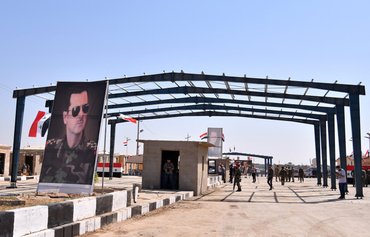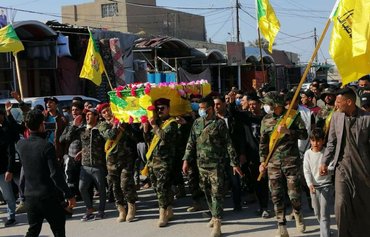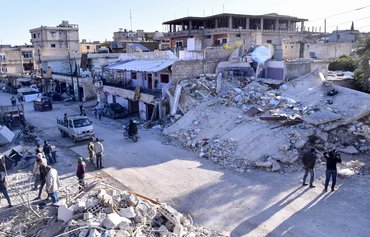A Syrian military source confirmed to Diyaruna the death on Sunday (November 29th) of Muslim Shahdan, a senior commander in Iran's Islamic Revolutionary Guard Corps (IRGC), on the Iraq-Syria border.
His death comes just two days after the assassination of top Iranian nuclear scientist Mohsen Fakhrizadeh in Iran.
"An unidentified drone targeted a vehicle carrying Muslim Shahdan, killing him and three companions on the spot," said Lt. Col. Hisham al-Mustafa, head of the Co-ordination and External Relations Office of the Political Authority of the Syrian province of al-Hasakeh.
The operation took place inside Syrian borders, as their convoy was passing the al-Qaim-Albu Kamal border crossing, coming from Iraq, he said.
![Members of the pro-Iran Fatemiyoun militia are seen in Syria's Albu Kamal, near the Iraq border, on April 20th. [Photo via Deir Ezzor 24 Facebook page]](/cnmi_di/images/2020/12/02/27283-Syria-Afghan-militia-600_384.jpg)
Members of the pro-Iran Fatemiyoun militia are seen in Syria's Albu Kamal, near the Iraq border, on April 20th. [Photo via Deir Ezzor 24 Facebook page]
He said that Shahdan, a high-level commander within the IRGC, gained attention after IRGC Quds Force commander Qassem Soleimani was killed in a US raid in Iraq in January.
Shahdan was charged with overseeing the pro-Iran militias stationed in eastern Syria, south of the Euphrates River, said al-Mustafa.
These include Iraqi militias such as Kataib Hizbullah, Harakat al-Nujaba and the Haidariyoun Brigade; Lebanese Hizbullah forces; and the Zainabiyoun and Fatemiyoun Brigades, comprising Pakistani and Afghan mercenaries, respectively.d
Shahdan was "directly responsible for the militias' terrorist activities", he said, which include the killing, arrest and torture of local residents, and efforts to effect demographic change.
The killing of Shahdan deals a "heavy blow" to Iran, particularly as the operation took place only two days after the assassination of Fakhrizadeh in Tehran, said al-Mustafa.
"Shahdan's assassination has provoked a state of confusion and high security alert in the ranks of militias deployed along the border with Iraq and in Deir Ezzor, al-Shamiya, al-Mayadeen, and all the way to the (Syrian) capital, Damascus," he added.
The militias' modus operandi in the wake of every attack is to rush to redeploy and boost security at the bases where they are stationed by digging trenches and strengthening fortifications in preparation for fresh attacks, he said.
"But this will not protect them from being struck again," said al-Mustafa.
Iran, PMF denial
Pro-Iran militia bases in areas on the Iraq-Syria border are often targeted by unidentified aircraft, which strike ammunition depots, vehicles and fighters.
An explosion was heard near the al-Qaim crossing inside Syrian territory on Sunday, in the so-called "safe passages" often used by Kataib Hizbullah and other militias to move between Iraq and Syria, sources told Independent Arabia.
The Iranian Foreign Ministry denied the killing of Shahdan, with its spokesman, Saeed Khatibzadeh, saying the ministry has "received no report regarding the attack".
He added, however, that questions on the matter should be directed to Iran's armed forces.
Iranian and most expatriate Persian-language media have not reported on the matter.
Meanwhile, the Popular Mobilisation Forces' Operations Commander in Anbar, Qassim Muslih, also denied the attack.
But a PMF source told Alsumaria News that the PMF are "not interested" in reporting news and military events outside the scope of Iraqi affairs.

![Muslim Shahdan, a senior IRGC commander, was killed in a drone strike near the Syria-Iraq border on November 29th. [Photo circulated on social media]](/cnmi_di/images/2020/12/02/27282-Iran-commander-IRGC-600_384.jpg)






